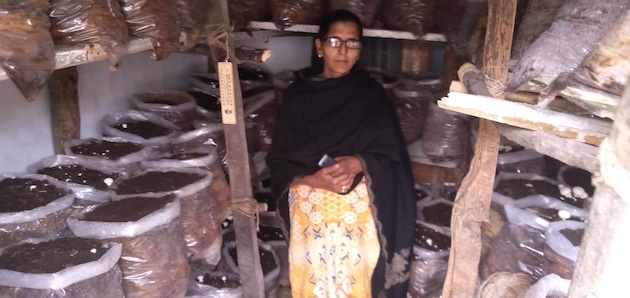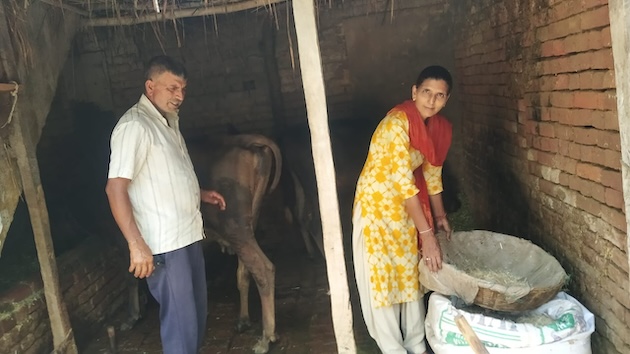R.S. PORA, India – Smelling the toxic smoke of burning gunpowder and staring helplessly at fields covered in smoke and ash has always been traumatic. Running to shelters, abandoning homes, belongings and livestock every time Indian and Pakistani forces open fire on each other is inexplicable. Then came the unpredictable weather brought on by climate change.
By Umar Manzoor Shah
But the people of this border village called Bala Chak, in the R.S. Pora sector of Jammu and Kashmir, have stoically faced these challenges for decades. In 1947, when the Indian subcontinent was partitioned and Pakistan was created as an independent country, the dividing line was also drawn in this village. Sialkote, a Pakistani town, was just a few metres away from the village.
Amidst the shabby dwellings scattered across the lush rice fields of Bala Chak, Surjeet Kumari tends to her mushroom crop in a dimly lit room next to her one-storey house.
Nearly 50, she has lived in this village for 25 years. Married to farmer Pardeep Kumar, Surjeet has a son and two daughters.
Farming in the open, says Surjeet, has always been dangerous in her village.
“You never know when a shell from the other side of the fence will hit your fields, and years of hard work will be destroyed in an instant. You will feel that everything you encounter afterwards will be a disaster. This happened to us in 2014 when hostilities peaked and Pakistan bombed our fields,” he says.
Surjeet’s priority was to ensure the education of her two daughters. A victim of patriarchy, she believes that education alone can end centuries of patriarchy and the misery it brings.
“I am the only female child and I have three older brothers. They were sent to school. They even got government jobs, but I was always told that I had to learn domestic chores; that is why I was born. When my daughters were born, I decided to give them a good life, a respectable life, free from the prejudiced eyes of the patriarchy,” Surjeet told IPS.
But making ends meet and paying for her children’s education has been costly.
As if the clouds of political uncertainty over the Pardeep camps were not enough, the drastic change in the weather pattern in 2017 wreaked havoc on the camps. The late arrival of the monsoon, coupled with unseasonal rains, created hardship for the village’s farming community.

Surjeet Kumari with her mushrooms. Image: Umar Manzoor Shah / IPS
The first thing she did to start her new life as a mushroom farmer, Surjeet says, was to set up a small room to grow mushrooms.
“Reluctantly, I told my husband about my plans. I told him that he need not worry about the income and that if all went well, we could have a decent income for a month. Thank God, he trusted me and allowed me to build a shed in the backyard of our house. He even built it himself,” he adds.
In the first three months of growing mushrooms, he was able to sell about 150 packets to wholesalers. He earned the equivalent of $200 in the first season.
In the next two and a half months, Surjeet was able to produce more than 170 packets, making a profit of about $250.
“I have become so familiar with the crop that I buy the seeds myself and know the business inside out. Sometimes I even tease my husband by telling him that I am earning more and he teases me by telling me that it is all thanks to the shed he built in the beginning,” says Surjeet with a smile.
Even when the COVID-19 pandemic hit, his income did not collapse.
“While the villagers were suffering from congestion, I was sure that I could earn an income from mushrooms. I even made mushroom pickles, which are in great demand in the market. I used to get direct enquiries from wholesalers even during the lockdown,” says Surjeet.
She believes that “the fact that this period did not affect my income is a blessing from Maa Durga (Hindu goddess)”.
She claims that by the time the ban was imposed, she was able to make compost from poultry manure, wheat straw, and horse dung. She adds that her husband helped her prepare the beds and harvest the crops.
For the past two years, the borders of Surjeet Kumari’s village have been quiet, with no major incidents of crossfire. The ceasefire agreement between the two countries earlier this year has brought about a positive change, and farmers in the border villages are seeing the results.
Pardeep, the husband, says that farming in the village has continued without incident for some time now and the family’s income is gradually returning to normal.
“It is all because of my wife’s hard work; the children are studying and we have cattle now. I did not know before that my wife was such a resilient woman, that when crises hit the family, she would be at the forefront to steer the ship into port. I am proud of her,” says Pardeep.
The other women in the village have started to come forward and sign up for various agricultural practices after seeing the good results of Surjeet’s efforts. And she is proving to be an effective leader for these ambitious women in her small village.
“In the past, like in other rural households, women were considered a commodity. They were expected to do all the household chores and were considered a burden,” says Surjeet.
But now things have changed. “Self-reliance is helping them break the chains and emerge triumphant. I teach them the skills and encourage them to work hard so that they can see the respect in the eyes of their families and husbands. I am doing my bit,” she says.
Madhulika Sharma, a senior official in the border area who helped with the training, says Surjeet has become a beacon of hope for other women who want to get out of financial crises and become more self-reliant.
According to Madhulika, “there was not much enthusiasm in her village when she enrolled in the program. Many women thought she was wasting her time, but she changed the situation”.
“Now she is a new hope for the women in her village. She guides them, mentors them, and even trains them in mushroom growing. It is all very inspiring,” she said.
T: PI / ED: EG






